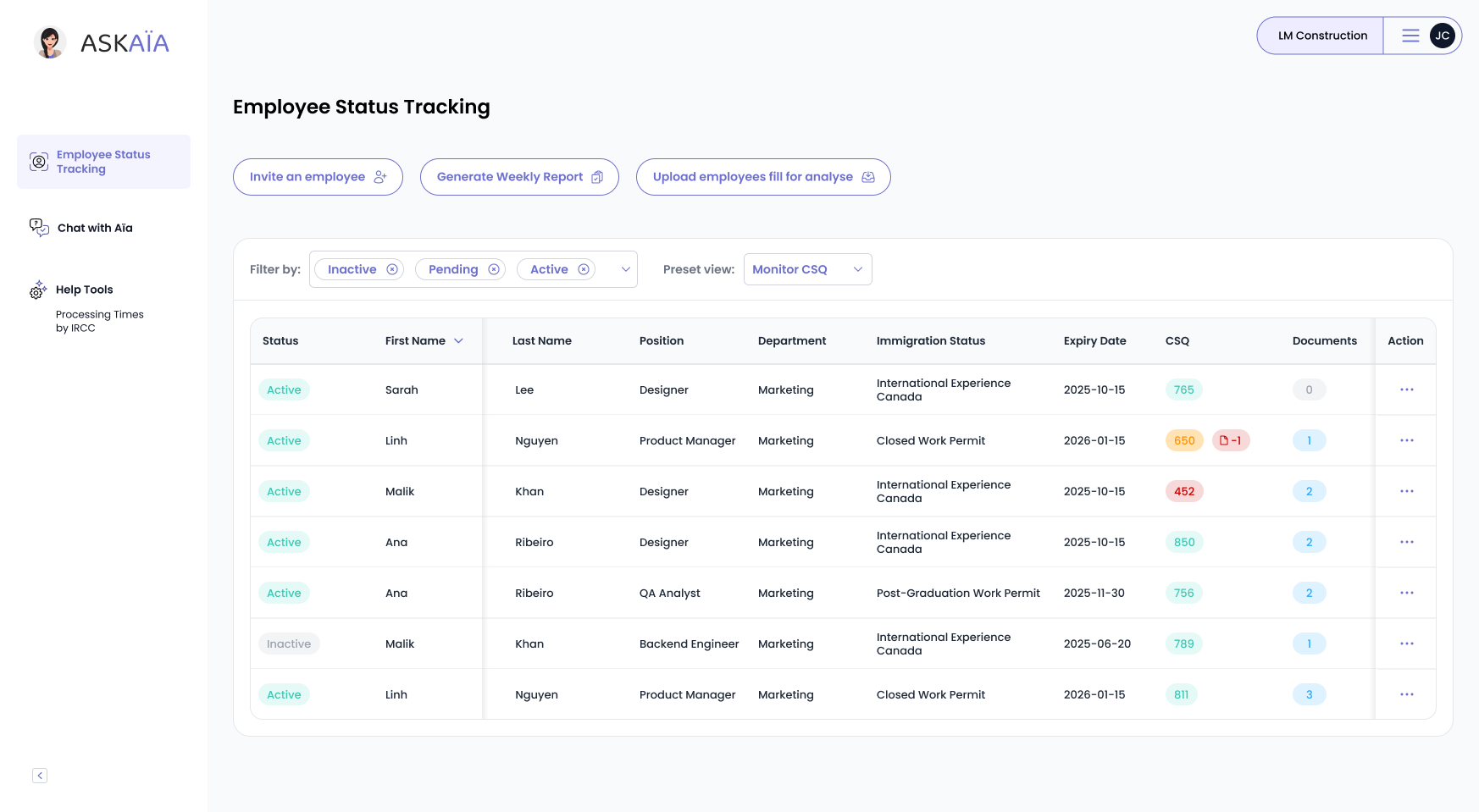Canada Work Permit Processing Time Nears 7 Months — Act Now

Canada's work permit system just got a lot slower — and barely anyone saw it coming. As of April 2025, processing times for work permits from inside the country have jumped to 201 days. That’s nearly seven months, and almost double what it was just a few weeks ago.
For employers and foreign workers alike, this isn't just a bureaucratic hiccup. It's a major disruption to hiring, renewals, and legal status — and the consequences could hit fast if you're not ready.
In this article, we’ll break down what’s happening, what it means for your plans, and how you can still take control. Whether you’re hiring internationally or renewing your own permit, you’ll learn how to avoid surprises — and why early planning has never been more critical.
Work Permit Delays Impact Employer Hiring Plans in Canada
For employers in Canada — especially in industries reliant on international talent like tech, construction, and healthcare — this increase in processing time means hiring timelines are no longer predictable.
When a work permit application is submitted from inside Canada, the process now takes more than six months - 201 days to April 16, 2025, even before considering additional steps. If the position requires a Labour Market Impact Assessment (LMIA), employers must also complete four weeks of mandatory job postings before even applying. In practice, this pushes the total wait time to seven to nine months.
This delay has ripple effects:
- Start dates are pushed back — sometimes indefinitely.
- Project timelines suffer, especially for roles with urgent needs.
- Retention risks rise, as foreign workers on expiring permits face uncertainty or status gaps.
Businesses that don’t adapt may find themselves locked out of the global talent pool — not because of a lack of candidates, but because of bureaucratic timing.
Work Permit Processing Delays Create Risks for Foreign Workers
For temporary foreign workers already in Canada, these delays are more than just an inconvenience — they’re a risk to legal status, income, and peace of mind.
When an application is submitted from inside Canada before the current permit expires, a worker may benefit from implied status — the right to stay and work under the same conditions while the new permit is being processed. But with a delay of 201 days, even small mistakes can have serious consequences.
Here’s what this means:
- Applying early is no longer optional — it’s essential.
- Workers should plan to submit applications at least 6 months before their current permit expires.
- Incomplete files or missing documents can trigger delays or even refusals — risking a loss of status and legal work authorization.
- Those changing employers or permit types (e.g. from closed to open) may face gaps in eligibility if they don’t time it precisely.
What used to be a manageable paperwork step has now become a strategic milestone. Missing it could mean being forced to stop working — or leave Canada altogether.
How to Plan for Work Permit Delays from Inside Canada
With wait times now stretching beyond six months, both workers and employers need to shift from reactive to proactive.
Here’s how to stay ahead:
- Reverse your timeline: Count backward from your permit’s expiry date. Aim to apply at least 180 days before — even earlier if your case is complex.
- Add time for LMIA: If an LMIA is required, budget 4–6 weeks just for job postings, interviews, and ESDC review before you can even submit the work permit.
- Avoid errors: A single missing document can send your application back to the queue. Use checklists, read IRCC guidelines carefully, or seek expert help.
- Track the clock: Understand when your implied status begins — and what you can and can’t do during that time.
- Keep communication open: Employers should check in with HR or legal advisors to build realistic timelines into their hiring plans.
A permit application isn’t just a form — it’s a project. And like any project, it needs milestones, deadlines, and contingency plans.
How AskAïa Supports Employers and Workers Facing Permit Delays
At AskAïa, we understand how stressful and complex the immigration process can be — especially when timelines are unpredictable. Our Workforce Solutions are built to provide practical support to both employers and workers navigating work permit issues inside Canada.
For employers, we help you:
- Build a realistic, step-by-step immigration plan for each employee
- Understand when to initiate LMIA and work permit processes
- Track status changes and permit expirations in one place
- Reduce risks of work interruptions due to status gaps
For workers, we offer:
- Personalized guidance on renewing or changing your permit
- Easy-to-follow checklists and reminders
- Support to explore pathways to permanent residence.
- Our goal is to make the process clearer and more manageable — so no one is left guessing, and no one misses a critical deadline.
Not sure how these delays affect your hiring or your status? Let AskAïa guide you through your next move — start with a free assessment tailored to your timeline and goals.

Let’s get your demo started
Book a demo
You May Also Like
These Related Stories

Prepare for 2025–2026 LMIA Changes: Key Policies HR Must Act On Now
As Canada recalibrates its immigration priorities, HR departments face a crucial inflection point. In 2025–2026, stricter LMIA rules could delay hirin …

Plan for LMIA Delays: Avoid 2025 Hiring Risks with Smart Planning
For Canadian employers recruiting temporary foreign workers, the Labour Market Impact Assessment (LMIA) is a critical, and often unpredictable, step. …

Extend Your Manitoba Work Permit: New 2-Year Option for PNPs
Manitoba has introduced a new public policy that allows eligible foreign workers to apply for 2-year open work permits—without needing a Labour Market …